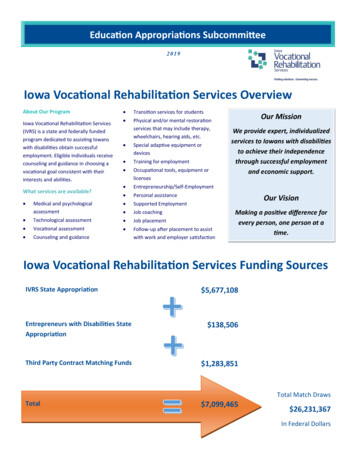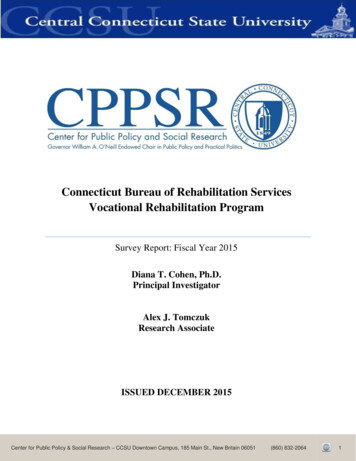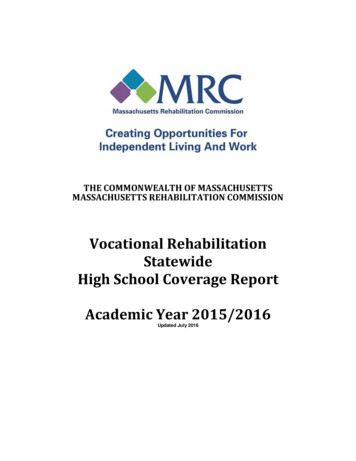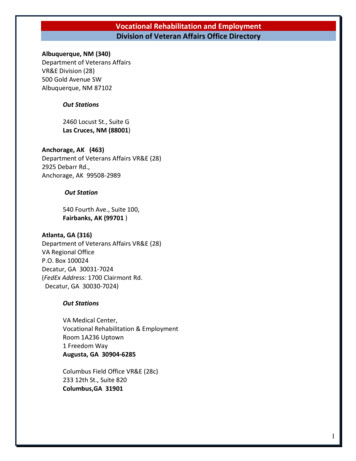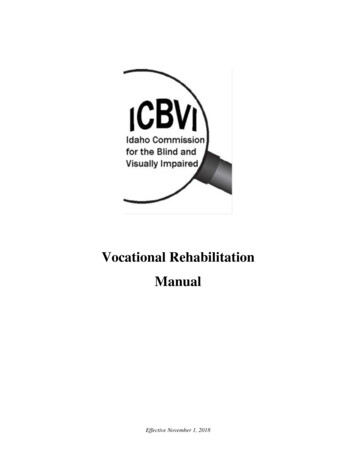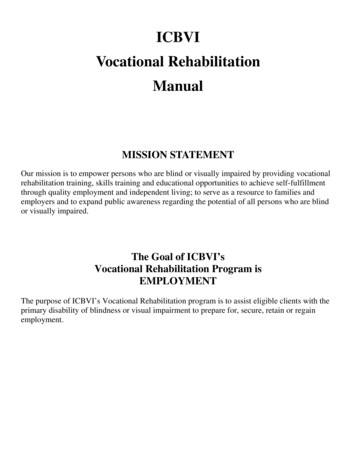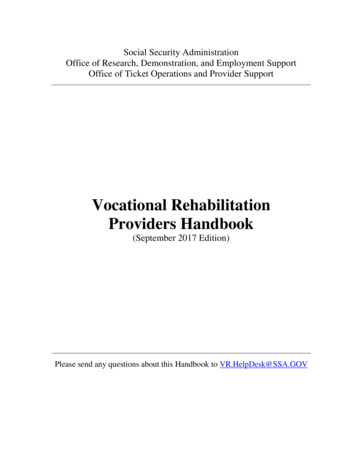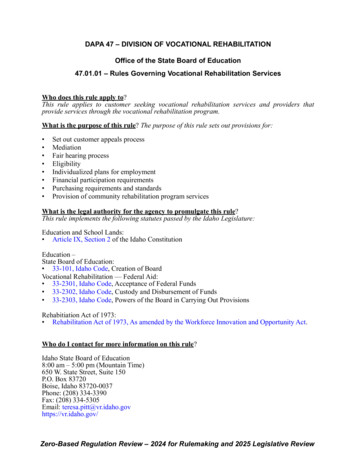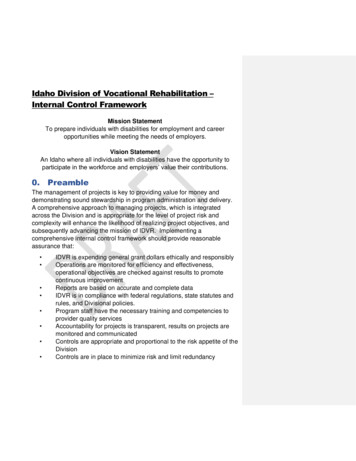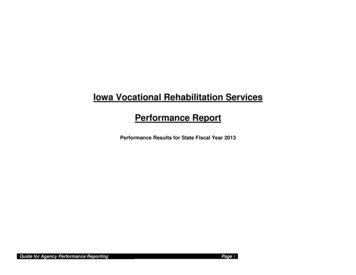
Transcription
Iowa Vocational Rehabilitation ServicesPerformance ReportPerformance Results for State Fiscal Year 2013Guide for Agency Performance ReportingPage 1
Table of Contents Introduction Agency Overview ResultsStrategic Plan goalsKey Results of Core Functions – Vocational Rehabilitation and Disability DeterminationAgency Performance Plan Results Resource Reallocations Agency Contacts Agency Performance Plan ResultsGuide for Agency Performance ReportingPage 2
IntroductionThis report will present the accomplishments of Iowa Vocational Rehabilitation Services (IVRS), a division of the Iowa Department of Education,for the state fiscal year ending June 30, 2013. Accomplishments include those related to core functions identified in the IVRS SFY 2013performance plan as well as progress toward goals in the 2011 - 2014 IVRS Strategic Plans. Information in this report is provided in accordancewith the Accountable Government Act to improve decision-making and increase accountability to Iowa stakeholders and citizens.Key services of the agency are essentially separated into two major program areas: 1. Services that assist Iowans with disabilities to becomeemployed in the competitive labor market or to live independently in their homes through provision of various supports. 2. Services involving theevaluation of Iowa citizens’ disabilities to determine eligibility for economic support via Social Security disability benefits.IVRS has managed a waiting list of potentially eligible clients seeking vocational rehabilitation services since May, 2002 and for several yearsthereafter has had to balance the need for VR services against lack of funding to meet all needs identified. IVRS was not able to match allavailable federal funding for VR services, which impacted IVRS’ ability to serve all persons applying for services. This has resulted in IVRShaving to manage a waiting list with approximately 1800 individuals on the list through the past year. Individuals with significant disabilities arewaiting approximately five months prior to being able to receive vocational rehabilitation services. Individuals with the most significant disabilitiesare moving directly into services after being determined eligible for services. The progress made in moving individuals directly into service, whilenot due to additional funding, was instead due to key management decisions in workforce planning and policy revisions along with the ability toreplace direct service employees whose positions had been vacated.The Disability Determination Services bureau has met and exceeded the requirements set out by the Social Security Administration for accuracyand timeliness associated with determinations on disability claims.This report will provide a brief update on progress toward the IVRS strategic plan goals as well as information on performance of the threeidentified core functions of the agency: Vocational Rehabilitation Services and Independent Living Economic Supports Agency Resource Management.Information for the two major program areas named above will be presented using the “Key Results Template”. These continue to be the mostcrucial indicators of this agency’s success in providing services to its customers.Agency OverviewIowa Vocational Rehabilitation Services (IVRS) exists to serve individuals with disabilities under Title II and Title XVI of the federal SocialSecurity Act and Title IV of the Workforce Investment Act. IVRS serves people with disabilities by: 1) providing vocationally related assistance toachieve economic independence; or 2) providing disability determinations that result in appropriate financial benefits per Social SecurityAdministration guidelines. Other services and financial assistance are provided to enable persons with disabilities to maintain independentGuide for Agency Performance ReportingPage 3
functioning as long as possible within their communities and to prevent institutionalization. IVRS is an integral part of the statewide disabilitycommunity.The current statements of mission and vision are included below. The Strategic Objectives are identified in the “Results” section of this report.MISSIONWe provide expert, individualized services to Iowans with disabilities to achieve their independence through successful employment andeconomic support.CORE FUNCTIONSAssist eligible Iowans with disabilities in obtaining, maintaining and advancing in employment through rehabilitation services individuallydesigned to disability and employment needs. Provide specialized services to the business community to meet their workforce and workplaceneeds.Determine eligibility of Iowans who apply for disability benefits administered by the federal Social Security AdministrationVISIONVocational Rehabilitation Services Vision: Making a positive difference with every person, one person at a timeDisability Determination Services Bureau Vision: Best Decision, Every Claimant, Every TimeBackground:IVRS is the largest division of the Department of Education and functions with considerable autonomy. The division employs almost 370 peoplein 44 locations throughout the state. Employees work within three Bureaus and a Planning and Development Team.For vocationalrehabilitation services, IVRS received 24.3 million in federal funds and another 5.1 million in non-federal funds; for disability determinationservices, IVRS received federal funds totaling approximately 24.4 million from the Social Security Administration (no state funds).The majority of staff persons are professionally trained rehabilitation counselors and disability examiners. Almost 98% of the counselors havemaster’s degrees in counseling or a closely related field. IVRS is mandated by its federal funding agency, the Rehabilitation ServicesAdministration, to have qualified rehabilitation counselors – i.e., possession of an appropriate graduate degree. All disability examiners have atleast a bachelor’s degree or its equivalent. In addition, DDSB has on its payroll 33 professional consultants who are licensed as physicians,Guide for Agency Performance ReportingPage 4
clinical psychologists, or speech pathologists. Most IVRS employees are covered under collective bargaining agreements negotiated with IowaUnited Professionals or the American Federation of State, County and Municipal Employees.All employees of the Planning and Development Team, Administrative Services and Disability Determination Services bureaus work in the DesMoines area. With the exception of a few administrative personnel and the West Central area office, most of the Rehabilitation Services Bureauemployees are geographically disbursed outside of Des Moines to cover all 99 counties and every high school in the state. As stewards of thepublic trust, IVRS maintains an efficient workforce by assigning staff to multiple locations so that every community college, regent’s institution,county, high school and most mental health institutes have access to an IVRS staff person.IVRS continues to collaborate with our partner agencies to improve work effectiveness. This occurs through communication and avoidingduplication of services through co-locating or itinerant offices in the Iowa Workforce Development Centers, community colleges, regent’sinstitutions and through coverage at our mental health institutions.The Rehabilitation Services Bureau (RSB) has the primary responsibility for the statewide program of quality vocational rehabilitation services toall eligible disabled Iowans through direct and purchased services from a network of providers. The focus of the RSB is training to prepare for,obtain, and maintain employment and as such works very closely with the Department of Education and Iowa Workforce Development. TheDisability Determination Services Bureau (DDSB) is responsible for determining the eligibility of Iowa residents, who apply for Social SecurityDisability Insurance (Title II), and Supplemental Security Income (Title XVI) or the Department of Human Services Medicaid programs. DDSBmakes the initial determination of eligibility and any subsequent determination of continuing eligibility and handles first-level appeals ofunfavorable decisions. The Administrative Services Bureau (ASB) provides fiscal, personnel, information services and administrative support tothe other Bureaus.The Planning and Development Team (PDT) is responsible for planning, program evaluation, and outreach -- including connecting with theNational Employment Network and disseminating that information to the RSB concerning national development of business contacts to fosterclient employment. There has been a deliberate attempt to increase visibility with business and industry and to integrate these services intodeveloping a placement culture for the Rehabilitation Services Bureau Staff. This has included the opportunity to partner with the NationalEmployment Network providing opportunities to better link job candidates with national and state employment opportunities as well as to marketthe value of Iowa businesses to a national audience. (See Business Outreach below for more detailed description)IVRS customers are individuals with disabilities who need vocational or other assistance to help meet their goals for employment through theRSB or personal independence or who need financial benefits due to their disabilities through the DDSB. Vocational rehabilitation and disabilitydetermination programs are eligibility rather than entitlement programs. Applicants must meet federally determined criteria. Customers of bothRSB and DDSB may apply on multiple occasions during their lifetime. Customers of the vocational rehabilitation program be they Iowans withdisabilities or the business community expect and receive professional and accurate career planning information and involvement to achieveworkforce planning, placement or personal independence. DDSB claimants require accurate and timely decisions on their claims.Competitive success is determined at the federal level by performance standards and indicators. In DDSB that translates to timeliness andaccuracy of case processing; on the vocational rehabilitation side, success relates to employment outcomes and equal access to services.Guide for Agency Performance ReportingPage 5
Strategic ChallengesIVRS was not able to match 5.26 million of available federal funds for 2013. The lack of funds resulted in 1,079 applicants for vocationalrehabilitation services remaining on waiting lists at the end of the year as well as a lack of capacity to expand occupational skill training programsto better meet the needs of our business customers.IVRS is federally (78.7%) and state (21.3%) funded, so, the multiplying effect of losing one state dollar due to budget cuts adversely impacts thedelivery of rehabilitation services. Caseload size for counselors is increasing, and management continues to evaluate each position that isvacated to ensure that the core functions needed result in the proper classification hired. RSB purchases supported employment servicesthrough community providers for the most significantly disabled due to the long term job coaching needs, which creates a challenge as more andmore providers have decided to withdraw this service as an option due to reduced funding. Individuals are placed on the waiting list because ofthe budget impact, and the lack of staff capacity to serve the number of individuals requesting services. This has been a continual focus ofEmployment First efforts with goals relating to improved employment outcomes in competitive, integrated community settings and an alignmentof resources between state departments supporting financial funding that encourages community, integrated employment.Training for job candidates continues to be a priority area as education provides necessary academic and vocational skills to help our clientscompete in the labor market. 96% of our graduating students remain in the state of Iowa and 70% of our successful employment outcomeshave some type of post-secondary education. There is also a close partnership with our secondary schools as we work with our youth intransition. Approximately 42% of our referrals are from our secondary schools. These efforts are closely aligned with the employment strategiesoutlined in the Skilled Iowa Initiative.IVRS continues to enhance technology (web-based software) to provide staff with a more efficient system to manage their work. This is anexpanding area requiring cost effective solutions to meet the needs of field staff and our job candidates in a mobile society. Issues related toconnectivity, security, and access will continue to be reviewed.IVRS has also attempted to collaborate with our community rehabilitation programs and county waiver programs in an effort to provide supportedemployment services in network with other comparable benefits and services. This is relatively a small portion of our customers, representingapproximately 2%.Funds for Independent Living case services continue to decrease. As a result there is a growing waiting list approaching two years for theprogram. With the departure of the Independent Living Specialist in October 2012, the IL caseload was assigned to an employee who handles ILcontracts and staff development. The time dedicated to State Independent Living Service Program will be limited to 20% of the programmanager. Therefore, we expect the number of clients served will decrease in 2014. Extensive contract monitoring procedures have beennecessary in the past year to ensure that contracting requirements are satisfied; IVRS continues to work with State Auditor’s office and Office ofAttorney General along with our federal compliance partners with the Rehabilitation Services Administration to ensure compliance, particularlyafter audits revealed significant issues with two of the Centers for Independent Living.While there are no direct competitors for Disability Determination Services, there is competition for funding with other Social SecurityAdministration entities and other states.Guide for Agency Performance ReportingPage 6
Business OutreachThe IVRS Business Network: During 2013 IVRS continued to infuse business outreach activities into local and state plans resultingin strengthened business relationships statewide.These relationships enhance the counselors’ understanding of business expectations and are directly connected to the planningprocess with consumers. It has been found by increasing employer involvement throughout the rehabilitation process, jobcandidates will have better information to make informed choice decisions on their career plans. An additional result is a broaderrange of employment opportunities available.Iowa Vocational Rehabilitation is committed to serving business and industry as a valued customer and in 2013 demonstrated thiscommitment through the following activities: The IVRS strategic plan highlights the importance of understanding the changing workforce needs of Iowa business andindustry and dedicates resources for developing IVRS’ capacity to respond to those needs. Rehabilitation Services management participate on each Regional Workforce Investment Board in the State of Iowa. TheAdministrator is an active participant on the State Workforce Board. Development of internships and on-the-job training opportunities has resulted in successful placements in various industriesacross the state. Iowa was chosen as a pilot site for Walgreens’ new Retail Employees with Disabilities Initiative (REDI). IVRS has partneredwith Community Rehabilitation Programs in 5 sites to roll-out this 120 hour in-store training program to help job-readycandidates become competent in retail and customer service skills essential for competitive employment. IVRS and Manpower are collaborating in an effort to provide a workforce solution to Iowa business and industry interested intapping into the underutilized talent pool of persons with disabilities. In 2013 IVRS has successfully placed 17 individuals intemp or temp-to-hire positions. IVRS continues to coordinate the activities of the Employer Disability Resource Network (EDRN),www.EDRNetwork.org. With the support of the EDRN partners private and public rehabilitation professionals arecollaboratively mobilizing resources, supports and services that add value to Iowa businesses hiring persons with disabilities. IVRS continues to be an active participant in the national and regional network (The NET) of 80 public VR agencies acrossthe country. The NET membership allows for participation in online trainings, sharing of multi-state job leads and keeping upto-date on federal employment opportunities.Guide for Agency Performance ReportingPage 7
Active involvement through the National Governor’s Association presenting information at three business panels regardingbusiness strategies in Iowa. The support of Project Search, an immersive school to work transition program providing direct exposure to the world of work. Continued efforts are being made to increase capacity for service delivery through our community rehabilitation partners. 1.383 million was spent with our community partners in 2013. The amount of referrals from IVRS to our community providersincreased to 794 from 673.Guide for Agency Performance ReportingPage 8
ResultsStrategic Plan:The IVRS strategic plan was revised in October 2011 and projected four major objectives to attain in the subsequent three (3) years; theobjectives are listed below.1. Develop and deliver customer service that addresses customer needs and requirements.2. Develop a workforce that identifies and responds to changing workforce and work place needs.3. Build external collaborative relationships which contribute to improved services for Iowans with disabilities.4. Establish/maintain financial Accountability/Sustainability resulting in increased service outcomes for individuals withdisabilities.Progress toward Strategic Plan objectives:Several staff continues to be involved in implementing actions intended to accomplish the stated objectives. Bureau Chiefs have continuedregular meetings with the Administrator regarding the strategic plan and are accountable for supporting staff and activities within each one’sbureau that contribute to accomplishment of the objectives.The DDSB has made progress on the FY11-14 IVRS Strategic Plan goals by realigning existing human resources, harnessing existingtechnology and focusing on employee retention through development programs.On site meetings were held with all staff in 2013 discussing the strategic plan and how it is integrated into daily activities. Feedback was solicitedfrom staff in multiple areas regarding how we can become better, faster and smarter with limited resources. This feedback is being reviewed andwill help identify targeted areas for change in 2014.Performance Plan ResultsSee enclosed templates for Key Results and Agency Performance Plan Results.Guide for Agency Performance ReportingPage 9
Resource ReallocationsResource reallocations in IVRS relate primarily to human resources as management continues to review and adopt the mosteffective staffing in relation to rehabilitation service delivery. The agency operates at a level that meets the current State standardfor span of control – approximately 1:15 ratio of supervisor to employees. Instead of automatically filling vacant RehabilitationCounselor jobs in the Rehabilitation Services Bureau, staffing patterns have been adopted which provide alternatives to moretraditional staffing without diminishing the professional level of service required for IVRS clients.We have continued to combine management positions wherever feasible. When geographic and other conditions have permitted,we combined area offices under one supervisor rather than maintain a supervisor for each major location as well as not replacingseveral management level positions when we can effectively determine delegat
This report will present the accomplishments of Iowa Vocational Rehabilitation Services (IVRS), a division of the Iowa Department of Education, for the state fiscal year ending June 30, 2013. Accomplishments include those related to core functions identified in the IVRS SFY 2013

